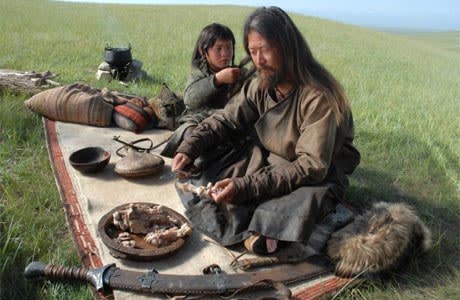This epic tale exploring the early life of Genghis Kahn, ruler of one of the largest empires in history, is an intriguing look into a time and place little seen on film. Mongol is the first part of a planned trilogy following the life of Timojin, more famously known as Genghis Kahn.
This first instalment follows Timojin from his childhood as the son of a Kahn of a small but powerful clan, concluding during his early adulthood, as he unites all the clans of the Mongol world. Despite the fact that this would seem the least interesting era of Genghis Kahns life, this heavily fictionalised interpretation of the tribulations faced by the powerful ruler in his youth is a captivating beginning to what is sure to be an incredible series of films.
Historical data on Timojins early life before becoming Genghis Kahn is sparse, so writers Arif Aliyev and Sergei Bodrov have liberally interpreted facts and folklore about the great leader to develop the story. Literary conceits help smooth over the complex minutiae of Mongolian clan politics and the tedious realities of life on the Mongolian steppes, favouring grand storytelling and epic tropes, such as fictionalising Timojins years of solitary existence in exile from his clan, as well as several interventions by God on behalf of the "chosen one.
Anyone watching Mongol for an accurate history lesson will be disappointed, instead you will get a taste of an ancient way of life, some beautiful cinematography of one of the harshest landscapes on Earth, a compelling adventure story and an introduction to a period in history thats underrepresented in the Western education system.
Mongol is a multi-national co-production and was nominated for Best Foreign Language film at this years Oscars (all the dialogue is in Mongolian, in case the title didnt tip you off). And, even if you arent really into subtitled films, Mongol is well worth the effort and the price of a ticket, as it is one of the most unique and interesting films you are likely to see this year.
(Alliance)This first instalment follows Timojin from his childhood as the son of a Kahn of a small but powerful clan, concluding during his early adulthood, as he unites all the clans of the Mongol world. Despite the fact that this would seem the least interesting era of Genghis Kahns life, this heavily fictionalised interpretation of the tribulations faced by the powerful ruler in his youth is a captivating beginning to what is sure to be an incredible series of films.
Historical data on Timojins early life before becoming Genghis Kahn is sparse, so writers Arif Aliyev and Sergei Bodrov have liberally interpreted facts and folklore about the great leader to develop the story. Literary conceits help smooth over the complex minutiae of Mongolian clan politics and the tedious realities of life on the Mongolian steppes, favouring grand storytelling and epic tropes, such as fictionalising Timojins years of solitary existence in exile from his clan, as well as several interventions by God on behalf of the "chosen one.
Anyone watching Mongol for an accurate history lesson will be disappointed, instead you will get a taste of an ancient way of life, some beautiful cinematography of one of the harshest landscapes on Earth, a compelling adventure story and an introduction to a period in history thats underrepresented in the Western education system.
Mongol is a multi-national co-production and was nominated for Best Foreign Language film at this years Oscars (all the dialogue is in Mongolian, in case the title didnt tip you off). And, even if you arent really into subtitled films, Mongol is well worth the effort and the price of a ticket, as it is one of the most unique and interesting films you are likely to see this year.
